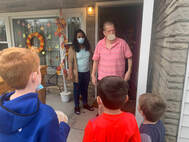 The church became very real to me when I was about nine years old. My mom had cancer and was in and out of the hospital, often for long periods, for the better part of a couple of years. During that time, my dad had three young sons to take care of (I was the oldest) while he worked a demanding job. The church became real in the faces of people who picked us up on weekends so my dad could be with mom. The church became real in meals dropped off at the house. The church became real in the way we were all embraced and supported by people who cared for us. The body of Christ was alive and moving in our lives. The beloved community was active and sharing God’s love with us. Looking back, I realize that for all that to happen, my mom and dad had to share the struggle with others. The closest family we had was five-hundred miles away, so neighbors, co-workers, and the church were the only connections we had. The church was our family in that time of struggle. I’m not so sure my dad or mom asked for help – they likely did not need to do that. They did have to allow the help to be given. I’m almost positive there was no organized “ministry” that handled these situations at the church. People just responded in love.
I am thankful when I see this kind of thing happen today – and it does with some frequency. It is God’s grace in incarnate. I have to say that I think it happens less so all the time. The church as a beloved community has had the bonds that bind us together eroded over time. The individualism of our age has grown to the point where people don’t share struggles. We keep things private. Perhaps we feel that we need to be strong, and accepting help is weak. Perhaps, in a world of transactions and purchases, we feel like accepting help and support from someone obligates us to them down the road. Perhaps the divisions of the world are so deep that they even invade the love of the community made by Christ. Perhaps our pride gets in the way. Perhaps we just think that our lives are no one else’s business. In the end, this all diminishes the communal aspect of the faith – which is at the heart of being the church. When Paul was in prison awaiting the emperor’s judgment on whether he would live or die, a visitor showed up from Philippi – which was a very long way away. Epaphroditus brought with him support, greetings of love, financial support (prisoners had to pay their own way then). Paul wrote back to the church saying, “I thank my God every time I remember you, constantly praying with joy in every one of my prayers for all of you, because of your sharing in the gospel from the first day until now.” (Philippians 1:3-5). Throughout the letter the love between Paul and the people of Philippi is obvious. Even in the dire situation they face, they rejoice. The body of Christ has transcended the suffering – the beloved community incarnates God’s love. This is the promise of being in Christ’s community. This is the central aspect of faith that seems to be slipping away each day. Christ, manifest in the body of Christ – the Church - is what offers grace and redemption, hope and love in a time of darkness. Without it our worship, learning, and even our ministry in the world become feeble and irrelevant. When people will reject a community that has nurtured them because they don’t like the music, disagree with one sermon, or are asked to wear a mask, it is a sign that true community is not only wasting away, but that community does not matter to us. When “my way” is more important than “our life together,” we stand convicted in our sin – and don’t even know it. May I testify? Hope is found in sharing the struggles of life with other people of faith. Hope is found in a community that expresses the love of Christ. Hope is found in a simple meal and a day at the zoo when your mom is sick. Pax Christi, Tim Olson – Lead Pastor
0 Comments
Leave a Reply. |
Categories
All
Archives
July 2024
|


 RSS Feed
RSS Feed

